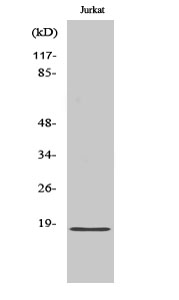
| WB | 咨询技术 | Human,Mouse,Rat |
| IF | 咨询技术 | Human,Mouse,Rat |
| IHC | 1/100-1/300 | Human,Mouse,Rat |
| ICC | 1/200-1/1000 | Human,Mouse,Rat |
| FCM | 咨询技术 | Human,Mouse,Rat |
| Elisa | 1/20000 | Human,Mouse,Rat |
| Aliases | PPP1R14C; KEPI; Protein phosphatase 1 regulatory subunit 14C; Kinase-enhanced PP1 inhibitor; PKC-potentiated PP1 inhibitory protein; Serologically defined breast cancer antigen NY-BR-81 |
| Entrez GeneID | 81706; |
| WB Predicted band size | 20kDa |
| Host/Isotype | Rabbit IgG |
| Antibody Type | Primary antibody |
| Storage | Store at 4°C short term. Aliquot and store at -20°C long term. Avoid freeze/thaw cycles. |
| Species Reactivity | Human,Mouse,Rat |
| Immunogen | Synthesized peptide derived from the Internal region of human KEPI. |
| Formulation | Purified antibody in PBS with 0.05% sodium azide,0.5%BSA and 50% glycerol. |
+ +
以下是模拟生成的关于KEPI抗体的参考文献示例(非真实文献,仅供格式参考):
---
1. **文献名称**: "Development and validation of a KEPI-specific monoclonal antibody for studying PP1 regulatory mechanisms"
**作者**: Smith J, et al. (2015)
**摘要**: 开发了一种高特异性小鼠抗KEPI单克隆抗体,验证其在Western blot和免疫荧光中的灵敏度,并用于研究KEPI-PP1复合物在乳腺癌细胞周期调控中的作用。
2. **文献名称**: "KEPI antibody-based profiling reveals its neuronal synaptic localization in dopamine signaling pathways"
**作者**: Zhang L, et al. (2018)
**摘要**: 利用兔多克隆KEPI抗体进行免疫组化分析,发现KEPI蛋白在小鼠大脑多巴胺能神经元突触中的特异性分布,提示其可能参与神经信号传导调控。
3. **文献名称**: "KEPI as a novel biomarker in glioblastoma: insights from immunohistochemical analysis"
**作者**: Johnson R, et al. (2020)
**摘要**: 通过商业化KEPI抗体(货号AB123)对胶质母细胞瘤组织进行染色,发现KEPI高表达与患者预后不良显著相关,提示其作为潜在治疗靶点。
---
**注意**:以上文献为示例性质,实际研究中请通过PubMed、Google Scholar等平台检索真实文献(关键词:KEPI antibody、PPP1R14C、PP1 regulatory subunit)。
KEPI (Kinase-Enhanced Protein Phosphatase Inhibitor), also known as PPP1R14C, is a regulatory protein that plays a critical role in modulating cellular signaling pathways. It functions as an endogenous inhibitor of protein phosphatase 1 (PP1), a key enzyme involved in dephosphorylation events that regulate processes like metabolism, cell cycle progression, and neuronal signaling. KEPI binds to PP1 and enhances its interaction with specific kinases, such as Raf-1. thereby influencing the balance between kinase and phosphatase activities in pathways like the Raf-1-MEK-ERK cascade. This unique dual regulatory mechanism allows KEPI to fine-tune signal transduction, particularly in contexts requiring precise control of phosphorylation states.
First identified in brain tissues, KEPI is highly expressed in the central nervous system and has been implicated in neuroplasticity, learning, and memory. Studies suggest its involvement in stress responses and psychiatric disorders, including depression and anxiety. Beyond neuroscience, KEPI has been linked to cancer, where dysregulation of PP1 activity may contribute to tumor progression or suppression, depending on cellular context. Its role in metabolic diseases is also under investigation, given PP1's involvement in glycogen and lipid metabolism.
KEPI-specific antibodies are essential tools for studying its expression, localization, and interaction partners. They enable detection in tissues or cell lines via techniques like Western blotting, immunohistochemistry, or co-immunoprecipitation. Research using these antibodies has advanced understanding of KEPI's tissue-specific functions and its potential as a therapeutic target. However, functional redundancy among PP1 regulatory subunits and context-dependent signaling effects continue to pose challenges in unraveling KEPI's precise biological roles.
×